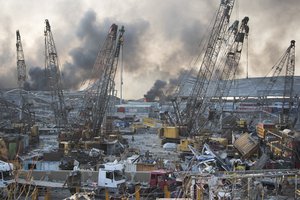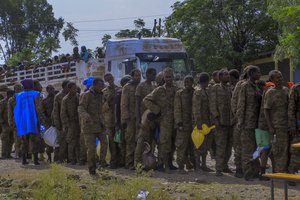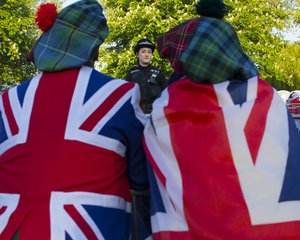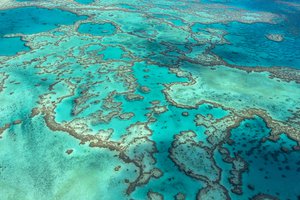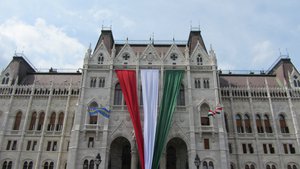- published: 08 Oct 2009
- views: 45491
- published: 11 May 2015
- views: 4953
- published: 28 Sep 2010
- views: 2251
- published: 11 Jun 2012
- views: 4097
- published: 24 May 2018
- views: 502
- published: 11 Apr 2014
- views: 1287
- published: 15 Sep 2014
- views: 8494
- published: 05 Dec 2011
- views: 771

Herta Müller
Herta Müller (born 17 August 1953) is a Romanian-born German novelist, poet, essayist and recipient of the 2009 Nobel Prize in Literature. Born in Nițchidorf, Timiș County in Romania, her native language is German. Since the early 1990s she has been internationally established, and her works have been translated into more than twenty languages.
Müller is noted for her works depicting the effects of violence, cruelty and terror, usually in the setting of Communist Romania under the repressive Nicolae Ceaușescu regime which she has experienced herself. Many of her works are told from the viewpoint of the German minority in Romania and are also a depiction of the modern history of the Germans in the Banat, and Transylvania. Her much acclaimed 2009 novel The Hunger Angel (Atemschaukel) portrays the deportation of Romania's German minority to Stalinist Soviet Gulags during the Soviet occupation of Romania for use as German forced labor.
Müller has received more than twenty awards to date, including the Kleist Prize (1994), the Aristeion Prize (1995), the International IMPAC Dublin Literary Award (1998) and the Franz Werfel Human Rights Award (2009). On 8 October 2009, the Swedish Academy announced that she had been awarded the Nobel Prize in Literature, describing her as a woman "who, with the concentration of poetry and the frankness of prose, depicts the landscape of the dispossessed".
-

HERTA MÜLLER - Literaturnobelpreis 2009 - Interview bei LITERATUR IM FOYER - SWR Fernsehen
Herta Müller: Atemschaukel Sommer 1944. Rumänien wechselt die Seiten. Der faschistische Diktator wird hingerichtet. Rumänien erklärt Deutschland den Krieg. Die neuen sowjetischen Verbündeten lassen alle Deutschen zwischen siebzehn und fünfundvierzig in Arbeitslager in der Sowjetunion deportieren. Zum Wiederaufbau des zerstörten Landes. Unter ihnen der junge Oskar Pastior, Büchnerpreisträger 2006 und einer der großen Lyriker deutscher Sprache. Herta Müller erzählt seine Geschichte. Eine Geschichte, die sie gemeinsam schreiben wollten. Oskar Pastiors überraschender Tod hat das verhindert. Darum ist "Atemschaukel" mehr als nur eine Biographie. Es ist ein literarisches Denkmal. http://www.swr.de/literatur-im-foyer
published: 08 Oct 2009 -

Verfolgung und Entwurzelung – ein Gespräch mit Herta Müller
Die Literaturnobelpreisträgerin Herta Müller spricht mit Rainer Moritz vom Hamburger Literaturhaus über ihre Kindheit in Rumänien und das Schicksal ihrer Familie, das durch die Zugehörigkeit der Familie zur deutschen Minderheit in Rumänien von Verfolgung und Entwurzelung geprägt war. Grundlage des Gesprächs war das kürzlich erschienene Buch Herta Müllers »Mein Vaterland war ein Apfelkern«, in dem sie über ihre Kindheit und Jugend in Rumänien sowie über ihr Ankommen und das Leben in Deutschland schreibt. Das Gespräch fand im Rahmen eines Europäischen Erinnerungstages der Körber-Stiftung und des Deutschen Historischen Museums zum Thema »Kriegskinder in Europa« statt. Lesung: Stephan Benson. Herta Müller, Mein Vaterland war ein Apfelkern © Carl Hanser Verlag München 2014
published: 11 May 2015 -

Romanian Nobel laureate Herta Müller revisits homeland
Romanian-born German author Herta Mueller, winner of the 2009 Nobel Literature Prize, has returned to Romania for a two-days visit some 20 years after she escaped the communist regime. In Bucharest, she met with journalists and readers. Duration: 01:15.
published: 28 Sep 2010 -

Landscape of the Dispossessed: Reading and Conversation with Nobel Laureate Herta Müller
Herta Müller is the 2009 winner of the Nobel Prize for Literature. She was born in 1953 in a German-speaking town in Banat, Romania, where her parents were members of the German-speaking minority. Herta Müller speaks in German with translation, moderated by founding and senior editors of AGNI: Askold Melnyczuk and William Pierce. Hosted by Boston University, Goethe Institut Boston, and the literary journal AGNI, on May 12, 2012.
published: 11 Jun 2012 -

Herta Müller. Il Premio Nobel interviene al Salone del Libro. Con Andrea Bajani
https://bit.ly/2kkj0K9 Divisa tra la lingua romena e la lingua tedesca, tra la tenerezza e la fiducia dell’infanzia e la spietata durezza, al contrario, della dittatura, la letteratura di Herta Müller, Premio Nobel, ha raccontato come poche altre hanno fatto le contraddizioni del Ventesimo Secolo. Il suo intervento al Salone del Libro Torino 2018, affiancata da Andrea Bajani, in occasione del conferimento del Premio letterario internazionale Mondello. Herta Müller è un'autrice Feltrinelli https://bit.ly/2kkj0K9 . Salone del Libro di Torino 2018
published: 24 May 2018 -

Taschentuch als Heimat: Nobelpreisträgerin Herta Müller im Kulturplatz
Mit einem internationalen Literaturfestival soll der Monte Verità bei Ascona wieder in die Welt strahlen. Eröffnet wird die zweite Ausgabe des Festivals mit der Literaturnobelpreisträgerin Herta Müller. Als diese 2009 den Preis entgegennahm, sprach sie in ihrer Dankesrede über die Bedeutung eines Taschentuchs. «Hast Du ein Taschentuch dabei?» So habe ihre Mutter täglich gefragt, bevor sie das Haus verliess. Noch heute steht für Herta Müller das Stück Stoff für die Einsamkeit der Menschen -- und die Sicherheit, die ihr die Mutter bot. Auch in ihrem Welterfolg, dem Roman «Atemschaukel». http://www.srf.ch/sendungen/kulturplatz/wahlheimaten-auf-dem-monte-verita-bei-ascona
published: 11 Apr 2014 -

Herta Müller Interview: Putin Makes Me Sick
"It's outrageous and it's far worse than what we had in our dictatorships back then", says German writer Herta Müller about Vladimir Putin and Russia's interference in the Ukraine. "I imagine that I am in their country. I would have risked as much as the Ukrainians in order to live another way", says the winner of the 2009 Nobel Prize in Literature in this outspoken conversation at this years Louisiana Literature festival. "Putin can't accept that the Soviet Union is gone. We have had it up to here. For decades they ruined our lives in Eastern Europe. Putin and his secret service should accept that we want no more of that." And Müller continues: "He should build infrastructure in that huge country of his and see to it that his people can have teeth and shoes. That should give him plenty...
published: 15 Sep 2014 -

Herta Muller
Herta Muller presentò su más reciente novela: todo lo que tengo lo llevo conmigo. Entre otras actividades, se presentó en el teatro diana de guadalajara para una noche de gala con arturo rìos donde se llevó a cabi una lectura dramatizada de fragmentos de su obra...
published: 05 Dec 2011

HERTA MÜLLER - Literaturnobelpreis 2009 - Interview bei LITERATUR IM FOYER - SWR Fernsehen
- Order: Reorder
- Duration: 14:09
- Uploaded Date: 08 Oct 2009
- views: 45491
- published: 08 Oct 2009
- views: 45491

Verfolgung und Entwurzelung – ein Gespräch mit Herta Müller
- Order: Reorder
- Duration: 57:13
- Uploaded Date: 11 May 2015
- views: 4953
- published: 11 May 2015
- views: 4953

Romanian Nobel laureate Herta Müller revisits homeland
- Order: Reorder
- Duration: 1:19
- Uploaded Date: 28 Sep 2010
- views: 2251
- published: 28 Sep 2010
- views: 2251

Landscape of the Dispossessed: Reading and Conversation with Nobel Laureate Herta Müller
- Order: Reorder
- Duration: 1:47:52
- Uploaded Date: 11 Jun 2012
- views: 4097
- published: 11 Jun 2012
- views: 4097

Herta Müller. Il Premio Nobel interviene al Salone del Libro. Con Andrea Bajani
- Order: Reorder
- Duration: 1:04:17
- Uploaded Date: 24 May 2018
- views: 502
- published: 24 May 2018
- views: 502

Taschentuch als Heimat: Nobelpreisträgerin Herta Müller im Kulturplatz
- Order: Reorder
- Duration: 6:08
- Uploaded Date: 11 Apr 2014
- views: 1287
- published: 11 Apr 2014
- views: 1287

Herta Müller Interview: Putin Makes Me Sick
- Order: Reorder
- Duration: 2:04
- Uploaded Date: 15 Sep 2014
- views: 8494
- published: 15 Sep 2014
- views: 8494

Herta Muller
- Order: Reorder
- Duration: 2:35
- Uploaded Date: 05 Dec 2011
- views: 771
- published: 05 Dec 2011
- views: 771



HERTA MÜLLER - Literaturnobelpreis 2009 - Interview bei LITERATUR IM FOYER - SWR Fernsehen
- Report rights infringement
- published: 08 Oct 2009
- views: 45491

Verfolgung und Entwurzelung – ein Gespräch mit Herta Müller
- Report rights infringement
- published: 11 May 2015
- views: 4953

Romanian Nobel laureate Herta Müller revisits homeland
- Report rights infringement
- published: 28 Sep 2010
- views: 2251

Landscape of the Dispossessed: Reading and Conversation with Nobel Laureate Herta Müller
- Report rights infringement
- published: 11 Jun 2012
- views: 4097

Herta Müller. Il Premio Nobel interviene al Salone del Libro. Con Andrea Bajani
- Report rights infringement
- published: 24 May 2018
- views: 502

Taschentuch als Heimat: Nobelpreisträgerin Herta Müller im Kulturplatz
- Report rights infringement
- published: 11 Apr 2014
- views: 1287

Herta Müller Interview: Putin Makes Me Sick
- Report rights infringement
- published: 15 Sep 2014
- views: 8494

Herta Muller
- Report rights infringement
- published: 05 Dec 2011
- views: 771

Herta Müller
Herta Müller (born 17 August 1953) is a Romanian-born German novelist, poet, essayist and recipient of the 2009 Nobel Prize in Literature. Born in Nițchidorf, Timiș County in Romania, her native language is German. Since the early 1990s she has been internationally established, and her works have been translated into more than twenty languages.
Müller is noted for her works depicting the effects of violence, cruelty and terror, usually in the setting of Communist Romania under the repressive Nicolae Ceaușescu regime which she has experienced herself. Many of her works are told from the viewpoint of the German minority in Romania and are also a depiction of the modern history of the Germans in the Banat, and Transylvania. Her much acclaimed 2009 novel The Hunger Angel (Atemschaukel) portrays the deportation of Romania's German minority to Stalinist Soviet Gulags during the Soviet occupation of Romania for use as German forced labor.
Müller has received more than twenty awards to date, including the Kleist Prize (1994), the Aristeion Prize (1995), the International IMPAC Dublin Literary Award (1998) and the Franz Werfel Human Rights Award (2009). On 8 October 2009, the Swedish Academy announced that she had been awarded the Nobel Prize in Literature, describing her as a woman "who, with the concentration of poetry and the frankness of prose, depicts the landscape of the dispossessed".
Latest News for: Herta Muller
Real Estate Transactions: July 30, 2021
- 1

